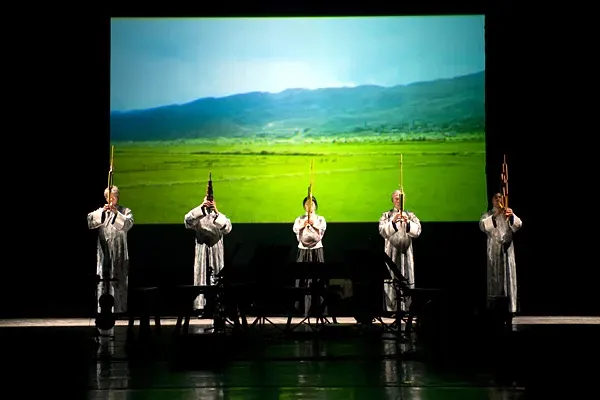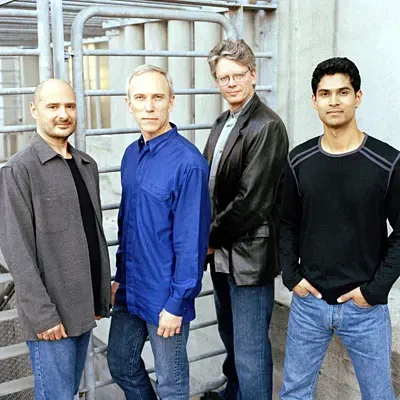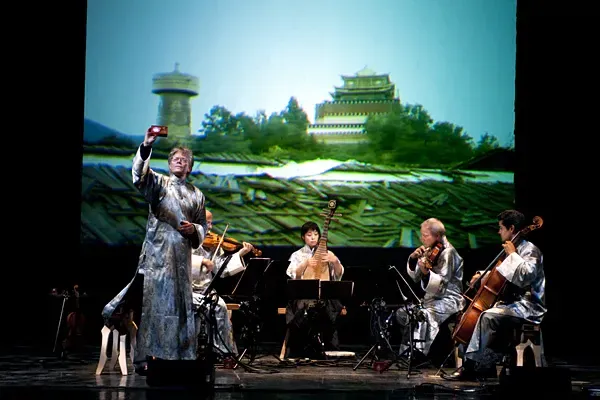AAF IV: Kronos Quartet violist Hank Dutt

Violist Hank Dutt shares some insights into his life as a member of Kronos Quartet, the international superstars of contemporary classical music.
Violist Hank Dutt shares some insights into his life as a member of Kronos Quartet, the international superstars of contemporary classical music.
With their Auckland Arts Festival performance featuring Chinese virtuoso pipa player Wu Man, Claire Cowan was keen to know what it's like to perform in the quartet that holds such a reputation for cutting-edge repertoire and cross-genre collaboration.
What are some of the joys/difficulties of combining traditional/folk music and musicians with modern classical instruments?
For me one of the greatest joys in playing with traditional folk musicians is learning from them. Their music has been passed down to them for generations and they know it intimately. You can catch a real glimpse of the person, gain a real understanding of them by listening to how they spin a phrase or watching how they feel the rhythm. And I gain so many insights just talking to them about their music and their culture.
What are the main attractions for you as performers in playing Chinese music?
Chinese music is so very different from the music I grew up with, the music I was trained to play, so it's great fun to explore this music new to me. Wu Man is a master of the pipa, the Chinese lute, and is in every respect a star. I've learned so much from performing with her and from her great advice. The wonderful thing about string instruments is that they can be quite versatile - with effort, you can make your fiddle sound like a human voice, or an Erhu, or even an electric guitar.
Have you ever played with traditional Maori instrumentalists? (taonga puoro)
No, we haven't had that opportunity yet. Hopefully soon.
What are some of the differences in approach for performers such as yourselves vs traditional / folk performers?
The main difference I would say is that most folk musicians play from memory. They've learned pieces through hearing others play it. We are western musicians playing from the written page. So our collaborations force us to listen and remember things more carefully, even improvise a bit if necessary. And it's an interesting challenge for them! Through careful rehearsal and a respect for other musical tradition, we hope to match the sound and character of our fellow musicians as closely as possible.
What are your favourite world music styles to perform and why?
Whatever I'm playing at the moment. But here are a few of my favorites.
Astor Piazzolla - I loved being only a foot away from his thrilling energy. And then in Buenos Aires, seeing and hearing people play and dance at the Tango Dance Hall!
Pieces of Africa project - each musician was a joy to work with and so different from each other. And each piece had an uplifting quality, even Dumi Maraire's Mai Nozipo which is sadly about his late mother.
Indian music - there is an Alap we play that is a loose transcription from a performance of Ram Narayan's on his Sarangi. Although the viola is not a Sarangi, it is in the same range. The playing technique is different also, so I developed a playing method to sound more like his instrument. It took a long time for me to do this, but was oh so rewarding. I am very proud of my performance now, and feel closer to his music.
You are the most famous string quartet in the world. Do you feel a lot of pressure to keep coming up with new ideas?
Our first violinist, David Harrington, is also our artistic director. He is the ultimate idea man. He is tireless in his search for interesting new works, and composers whose voices have not yet been heard. I mean that quite literally - I'm not entirely sure when he sleeps. We all have had a great journey so far, and I'm looking forward to seeing what new paths we will explore.
As a foursome what do you think has been the key to your phenomenal success in working and touring together over the years?
I'm afraid I can't tell you. I don't think much about success. We just work hard at our music, week in and week out. I feel I've grown a lot from being in the quartet - taking on music which challenges me in so many unexpected ways.
It also helps that the four of us enjoy performing - and if the performers are having a good time, the audience usually will as well. I had the pleasure of hearing the Amadeus Quartet a few times. I vividly recall the passion and commitment they brought to their concerts. I hope that our audiences can have a little of that same experience.
What's your Big Idea for 2013?
Our "Big Idea for 2013" is to perform music that changes people. 100 years ago, the first performance of Stravinsky's Rite of Spring caused a riot in the theater. Imagine a piece of music able to get people out of their seats, even if it's only to be angry. Although we don't want to cause a riot, indifference is the enemy of art. We want to give people experiences which change them somehow. Music can breed tolerance and understanding, it can inspire people by showing humanity at its best - in joy, in sorrow, and in life.
Peace
- The Auckland Arts Festival 2013 is on from 6 to 24 March

